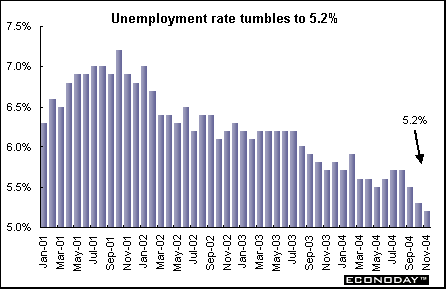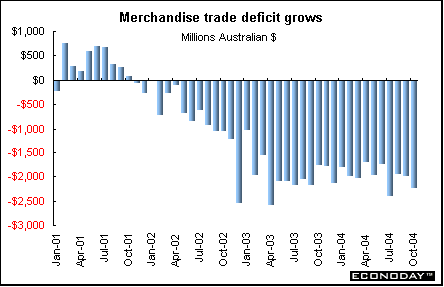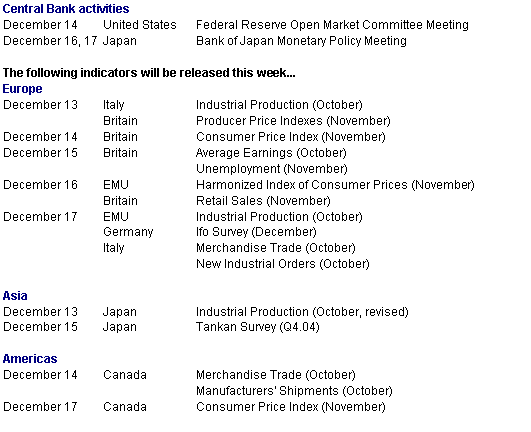Monday, December 13, 2004

Three central banks met last week and decided to keep their policy interest rates where they were. The Bank of Canada marked time at 2.5 percent while the Reserve Bank of Australia stayed at 5.25 percent and the Bank of England at 4.75 percent. The Federal Reserve and the Bank of Japan meet this week to wind up central bank activities for the calendar year.
Bank of Canada
The Bank of Canada left its benchmark interest rate unchanged at 2.5 percent and backed off a plan to increase borrowing costs in the future, saying the country's surging dollar may slow exports and inflation. The Bank of Canada had increased borrowing costs at its past two meetings by 25 basis points each. The currency's increase has made Canadian goods more expensive for international buyers and cut exports in the third quarter. In its statement Friday, the Bank said it is concerned the currency's gain may slow growth further and dropped a phrase signaling its intention to push up interest rates at some point in the future.
Due to sagging exports, GDP growth slowed to an annualized rate of 3.2 percent in the third quarter from 3.9 percent in the previous quarter. Data for first half of the year were revised down, suggesting the economy wasn't as close to full output as the Bank had previously said. Canada's exports are equivalent to 40 percent of its C$1.1 trillion economy, the largest share in the Group of Seven industrialized nations. A stronger currency helps hold down inflation by making imports cheaper and pressuring domestic companies to cut prices to stay competitive. The Bank has an inflation target range of 1 percent to 3 percent and focuses on the 2 percent midpoint.
Reserve Bank of Australia
The Reserve Bank of Australia marked time for the 12th month and left its key interest rate at 5.25 percent after the economy grew at its slowest pace in four years. While the nation's rising currency (Australian dollar) is curbing export earnings, last November and December's rate increases have cut home building and curbed consumer spending. The RBA doesn't release a statement when rates are kept unchanged. Inflation remains within the Bank's target of between 2 percent and 3 percent. The third quarter's 1.2 percent annualized GDP growth was the weakest since the economy contracted in the fourth quarter of 2000. The RBA will not meet until February - they are taking their customary summer vacation in January.
Bank of England
As expected, the Bank of England left its benchmark interest rate unchanged at 4.75 percent for the fourth month amid sliding industrial output and declining house prices. Third quarter annualized GDP growth dropped to 1.8 percent from 3.7 percent in the second quarter. Inflation remains under control and well under the Bank's inflation target of 2 percent. The Bank of England's most recent inflation report forecast stronger investment and higher exports will take over from consumer spending as a spur to economic growth. Yet there has been little evidence that the health of Britain's exporters is improving.
Japan's GDP growth not what it seemed to be
Japan has made a major change in the way it calculates gross domestic product -the third way it has measured growth in the last few years. Now the methodology is patterned after the way GDP is calculated in the U.S. and other major industrial countries. Japan's GDP data have always been taken with a grain of salt by analysts. Japan's economic data have been notoriously prone to corrections, and it is not unusual for the government to reverse itself on positive growth figures and later say that the economy shrank. So it should have been no surprise that the latest version of GDP gives a vastly different picture of the Japanese 'recovery' of the past few years. The graph below compares the new and old data.

The difference lies in the way that price changes are handled. The new reading is intended to eliminate distortions when prices for such things as cell phones and computers fall rapidly. Now the GDP deflator will be rebased annually rather than once every five years. Although prices have been declining for years in Japan, the old GDP calculation tended to overstate the pace of decline. The growth figure that economists and investors focus on is real GDP (growth after accounting for changes in the prices of goods and services). But when prices are falling, deflation is added to nominal growth to come up with real growth. Under Japan's old method deflation was overstated and as a result so was real GDP.
The new numbers bear more of a relation to the indicators that have been unremittingly poor since the second quarter 2004 and suggest that the government's recent downgrading of the economic outlook is several months late. And far from equaling or even outpacing the U.S., Japan has lagged with indications of worse to come as the yen rises and domestic demand remains moribund.
OPEC tries to stem declining oil prices
At its meeting on Friday, the Organization of Petroleum Exporting Countries (OPEC) agreed to cut output by about 4 percent to prop up prices after the biggest drop in three years. This translates to a reduction of about 1 million barrels per day to meet a quota of 27 million barrels a day that is aimed at preventing inventories from increasing in early 2005. The production cut is an attempt to eliminate over quota production by member countries. Oil is about 35 percent higher than a year ago and is poised for its fifth annual gain in six years. Ministers have been deliberating proposals to increase their formal price target, of $22 to $28 a barrel, to $30 or more to compensate for a weakening dollar and inflation. The benchmark has been above that level for about a year. The group will meet again Jan. 30 in Vienna to consider production for the second quarter, when demand slows for seasonal reasons.

The International Energy Agency, an adviser to oil-consuming countries, said OPEC should not lower output because larger inventories are needed to compensate for a lack of production capacity. OPEC's price benchmark has fallen 26 percent since October 21st, the largest six-week drop since demand collapsed after the September 11, 2001 attacks.
Global markets retreat
It was a rather sober week in the equity markets as 12 of the indexes followed here declined. A partial explanation could be that investors are squaring year-end positions and taking profits in thin pre-holiday markets. Mexican shares on the Bolsa were the only positive light. The index was up 1.3 percent on the week and has climbed 39.4 percent so far this year, outperforming other indexes followed here.
Global Stock Market Recap

Europe and Britain
European and British stocks were down on the week as investors began to take profits and wind down their activities for the calendar year 2004. Stocks traded in part on the ups and downs in oil prices as well as movements in U.S. indicators. On Friday, oil company stocks were popular once again after OPEC said they decided to cut production. This was interpreted as good for those engaged in the energy industry. In contrast, the news wasn't good for auto companies. Their profits are suffering from higher energy costs as are profits at airlines.

Despite hopes that it would finish the year above 4,800, the FTSE suffered a hit this week as it put in its worst performance for seven weeks. Not only did the index slide below 4,800 but it also ended the week under 4,700 level. Analysts opined that the simultaneous expiration next Friday of options and futures contracts, or triple-witching, means there's little incentive to get involved in what could be a volatile market. But some suggested that large investors were driving the market down through short-selling with the goal of buying stocks back at a cheaper price closer to the year-end.
Asia/Pacific
Japanese indexes were down as investors contemplated the most recent downward revisions to GDP - along with other weak and depressing data. The government also reported worse-than-expected machinery orders for October. Machinery orders are widely regarded as a leading indicator of corporate capital investment. As a result, Japanese stocks suffered their biggest weekly drops in eight weeks. Banks such as Mizuho Financial Group slipped on concern that the Tankan survey to be released this week will show declining confidence in the economy. Banks fell on concern a slowing economy will hinder their efforts to write off bad loans and increase lending. What's keeping investors away from buying Japan is concern about growth prospects. The Nikkei lost 2.9 percent this week while the Topix slipped 2.4 percent, their worst declines since mid-October.

Other Asia/Pacific stocks were down on the week as well. In Hong Kong, the Hang Seng Index lost 2.2 percent last week as the market was dragged down by selective profit-taking and the absence of any positive market-moving news. Despite its loss this week, the Australian all ordinaries continue to be the best performing index in this region - up 18.3 percent over its 2003 close. The last time the index was down was the week of October 22nd. Also with double-digit gains for the year are the Hang Seng, up 10.5 percent, and Singapore's STI, up 14.3 percent.

Currencies
The U.S. dollar rebounded against the major currencies last week. But most saw the move as little more than a correction in the currency's long-term downtrend. The prospect of any sustained dollar bounce is undermined by the perception that Asian central banks will use any periods of dollar strength to shift some of their vast foreign exchange reserves away from the dollar. The dollar's bounce in some part was attributable to the lack of interest rate increases by the Reserve Bank of Australia as well as the Banks of Canada and England. It strengthened the view that monetary tightening may be pretty much over in most of the world, apart from the U.S. where significant tightening is still expected. Also contributing to the declines in the yen and Australian dollar were soft economic data from both countries.

The rhetoric continues from European policy makers and the ECB. But ECB President Jean Claude Trichet put it most succinctly when he described the currency's moves as "brutal". But in reality, blaming the euro for weak domestic demand does little to explain the EMU's anemic growth. Changes in structural rigidities in both labor and business (especially in retailing) might go further in giving the economy the boost it needs to help it compete on a more level playing field.
Indicator scoreboard
Germany - December ZEW economic expectations index climbed to 14.4 from 13.9 in November. This was the first increase since July as relief over falling oil prices slightly outweighed concern about the euro's strength and its impact on German exports. The index is calculated by the Center for European Economic Research (ZEW) in Mannheim. The ZEW surveyed 300 German financial experts between November 22nd and December 6th for their opinions on current economic conditions and the economic outlook for major industrial economies.

October seasonally adjusted manufacturing orders jumped 1.1 percent and were up 3.8 percent when compared with last year. Domestic orders surged 3.3 percent thanks to a large increase in bulk orders, while foreign orders sank by 1.2 percent. All orders categories were up with consumer goods increasing by 2.4 percent and capital goods orders up 1.6 percent. West German orders were up 1.1 percent and east German orders were up 1.2 percent.

October seasonally adjusted industrial production jumped 0.6 percent and 1.9 percent when compared with last year. Industrial production excluding the construction sector also was up 0.6 percent on the month. Manufacturing output was up 0.9 percent while construction jumped by 1.5 percent. Capital goods and basic goods were up but were partly offset by declines in both consumer durables and nondurables.

October seasonally adjusted merchandise trade surplus climbed to �12.3 billion from �12.0 billion in September. Exports were up 1.2 percent and 10.2 percent on the year. Imports increased 0.8 percent and 9.3 percent on the year. The increase in imports partly reflects higher oil prices, and is not entirely related to strengthening domestic demand.

France - October seasonally adjusted industrial output dropped 0.7 percent but was up 1.4 percent when compared with last year. Manufacturing output was also down 0.7 percent but it was up 2.4 percent on the year. All categories were down on the month with the auto sector retreating by 2.2 percent after hefty gains in the previous two months. Consumer goods were down 1.2 percent while capital goods dropped 0.4 percent.

October seasonally adjusted merchandise trade deficit plunged to �2.1 billion, the largest deficit on record. Exports were up 0.3 percent while imports surged 4.9 percent. Energy accounted for roughly half the increase with a 25 percent jump.

Italy - Third quarter gross domestic product was up an unrevised 0.4 percent and 1.3 percent when compared with last year.

Britain - October industrial production was down for the fifth consecutive month, sliding 0.1 percent and down 1.9 percent when compared with last year. Manufacturing output was also down 0.1 percent and 0.5 percent on the year. Output declined for basic metals & metal products and electrical & optical equipment.

October global merchandise trade deficit jumped to Stg5.30 billion from Stg4.44 billion in September. The latest data ensure that the 2004 trade gap will be the highest since records began in 1967. The value of imports jumped 2.5 percent to Stg21.5 billion, the highest on record. Exports declined 2 percent to Stg16.2 billion. Most of the deterioration came from a widening in the deficit with non-EU countries, though the deficit with EU countries also widened. The underlying trade deficit, excluding oil and erratics, widened even more sharply to Stg5.591 billion from Stg4.54 billion in September.

Asia
Australia - November employment was up by 24,500 jobs. In the last three months, the economy has added a total of 134,700 jobs. The unemployment rate fell to 5.2 percent from 5.3 percent in October.

October merchandise trade deficit widened to A$2.24 billion ($1.7 billion) - the largest in three months. The increased value of the Australian dollar has eroded export earnings and the cost of imported fuel has increased. Imports, which reached a monthly record in July, were virtually unchanged. Consumer goods imports dropped 1 percent but capital goods imports were up 8 percent. Exports declined by 1.8 percent. Exports of rural goods, such as meat, wheat and wool, dropped 8 percent.

Bottom line
Investor eyes will be focused on Japan and the release of its very important Tankan survey on December 15th. Long regarded as the most important indicator of the economy's performance, the index looms even larger this week given the sizeable downward revisions to GDP and the lackluster performance of other economic data. The Tankan measures confidence in the economy among company executives and is parsed a hundred different ways to reveal the spirits of both small domestic firms as well as large multi-nationals.
Also on the agenda are meetings of the Federal Reserve Open Market Committee and the Bank of Japan's Monetary Policy Committee. Unlike many other central banks that are preferring to maintain the status quo and leave their policy rates unchanged, the FOMC is expected to continue is slow 25-basis-point upward progression. The Bank of Japan is not expected to change its policy. It has said many times over that there will be no change from a zero interest rate policy until there are definitive signs that deflation has been banished from the economy.
Looking Ahead: December 13 through December 17, 2004




